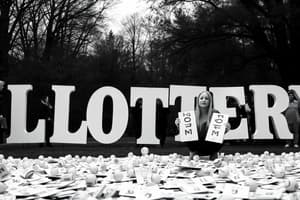Podcast
Questions and Answers
What does the village lottery culminate in each year?
What does the village lottery culminate in each year?
- A celebration
- A violent murder (correct)
- A festival
- A new square
What do villagers use to gather during the lottery preparation?
What do villagers use to gather during the lottery preparation?
Stones
The villagers know the origin of the lottery.
The villagers know the origin of the lottery.
False (B)
What is the structure that determines which member of a family draws from the box?
What is the structure that determines which member of a family draws from the box?
What does the shabby black box represent?
What does the shabby black box represent?
Match the following themes from 'The Lottery':
Match the following themes from 'The Lottery':
The lottery is a new tradition in the village.
The lottery is a new tradition in the village.
What happens to the villagers' perception of Tessie Hutchinson once she draws the marked slip?
What happens to the villagers' perception of Tessie Hutchinson once she draws the marked slip?
Flashcards are hidden until you start studying
Study Notes
The Danger of Blindly Following Tradition
- The village lottery ends with a violent murder, illustrating how perilous unexamined traditions can be.
- Initial appearances of the lottery seem innocent, with preparations including children collecting stones.
- Villagers lack knowledge of the lottery's origins but continue the ritual out of tradition, reflecting society's attachment to outdated practices.
The Randomness of Persecution
- Individuals are randomly selected as victims, solely based on drawing a wrong slip of paper.
- The lottery ensures that everyone, including children, has an equal chance of being chosen for execution.
- The abrupt shift in perception towards the victim, especially Tessie Hutchinson, highlights societal mob mentality and loss of identity.
- Innocence holds no value once a person is marked for death; social bonds rapidly dissolve during the act of persecution.
Family
- Family connections play a crucial role in the lottery’s structure, with all members required to participate.
- Despite familial ties, there is no loyalty evident when a family member becomes the victim, as seen when Tessie's family turns against her.
- The lottery reveals the brutal reality that family relationships do not guarantee support or compassion in times of crisis.
Rules
- Numerous complex rules govern the lottery, creating an illusion of order and purpose.
- Mr. Summers implements specific procedures during the lottery, including who draws and when to reveal the results.
- Some rules remain adhered to while others are neglected, illustrating the underlying chaos of the lottery’s outcome.
- The vacillation of rules emphasizes the senselessness and randomness of the violence that ensues.
The Black Box
- The black box symbolizes both the tradition and irrationality of the villagers' allegiance to the lottery.
- It is dilapidated yet irreplaceable for the villagers, who justify their reverence through a legacy passed down associated with older boxes.
- Contrasts exist, such as the shift from using wood chips to paper slips, highlighting selective adherence to traditions.
- The villagers' inconsistent loyalty questions the rationale behind maintaining such a dangerous ritual.
The Lottery
- The lottery epitomizes unfounded practices that are handed down and followed without critical examination.
- It has become ingrained in the village culture, represented by the saying “Lottery in June, corn be heavy soon.”
- Despite alterations and decline in some aspects of the ritual, the lottery persists as a significant communal event.
- This situation exemplifies the dark consequences of unchallenged traditions, culminating in collective complicity in yearly murder.
Studying That Suits You
Use AI to generate personalized quizzes and flashcards to suit your learning preferences.




